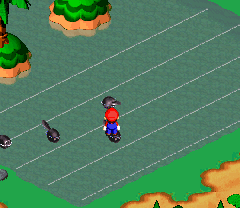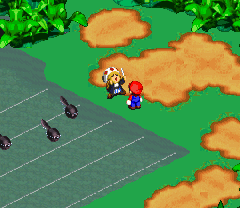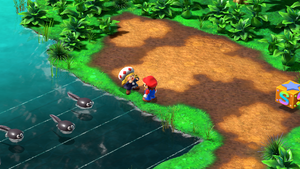Melody Bay
| Melody Bay | |
|---|---|
 Mario in Melody Bay in Super Mario RPG: Legend of the Seven Stars | |
| First appearance | Super Mario RPG: Legend of the Seven Stars (1996) |
| Latest appearance | Super Mario RPG (Nintendo Switch) (2023) |
| Greater location | Tadpole Pond |
| Inhabitants | Toadofsky, tadpoles |
Melody Bay is a part of Tadpole Pond in Super Mario RPG: Legend of the Seven Stars. It is home to the composer Toadofsky. Mario can play music here by jumping across on tadpoles. The bay has lines like a musical score, and the position of a tadpole when Mario jumps on it determines what note is played. From top to bottom, the notes are Mi, Re, Do, Ti, La, So, and Fa. The notes are designed in the treble clef, and each note, starting with Do, is one on the C major scale. Songs played in Melody Bay are always eight notes long.
Mario, Luigi, and Toad briefly visit Melody Bay in Mario and the Incredible Rescue to retrieve one of the six Mushrooms from Toadofsky (called "Toadofski" in the book).
Four songs for Toadofsky[edit]
Frog Sage's suite no. 18[edit]
- “Sounds. Laughter. Mirth. Revelry. Donuts. Reading. Dolphins. Relax.
-A few notes on my latest tune.” - —Sign behind the Frog Sage, Super Mario RPG
This is the first song that played for Toadofsky at Melody Bay. Mario must read the poster at the Frog Sage's study before attempting to figure out the composition. The correct notes are So, La, Mi, Re, Do, Re, Do, and Re. After Mario plays the correct notes back to Toadofsky, he rewards Mario with the Alto Card.
Moleville Blues[edit]
- “Diggin' deep in the "MI"nes~ "DO"n't get much sun!~ I'm covered with "SO"il~ 'till my workday is "DO"ne~ I "RE"ally hate sittin'~ It's "LA"bor I choose~ 'cause then's the "TI"me~ To "DO" them old Moleville blues!~”
- —A mole singing the Moleville Blues, Super Mario RPG: Legend of the Seven Stars
After the player saves Dyna and Mite when adventuring to Moleville, going back into the area that Croco destroyed reveals several workers. They want to sing a song, and hidden in the lyrics are the notes to the Moleville Blues, which are Mi, Do, So, Do, Re, La, Ti, and Do. When this is played for Toadofsky, Mario earns the Tenor Card.
Monstro Town Star Song[edit]
Upon Mario's first arrival to Monstro Town, when he goes in the house where the Monstermama lives, upstairs is a Starslap. If Mario tries talking to it, it will dance a little and play a short song that sounds like the tadpoles at Melody Bay. This is the third and final song. However, the one thing that is different this time is the notes do not appear onscreen, but there is a piece of paper to the left of the Starslap that shows where the tadpoles should be. The correct notes are La, Ti, Do, Re, So, Do, Re, and Mi. Playing this song correctly for Toadofsky rewards Mario with the Soprano Card.
Mario and Toadofsky's Original Composition[edit]
When Mario completes all three songs for Toadofsky, he asks Mario to compose an ending for the song. At this point, Mario can use any of the eight notes available to compose an ending for Toadofsky's song. The final song will be a collaboration of all three songs put together with Mario's composed finish piece. Mario can change this ending anytime he wants to.
Given items[edit]
There are three items found in Melody Bay and they are given by Toadofsky after helping him with his compositions:
| Item | Image | Availability | Location image | |
|---|---|---|---|---|
| Original | Remake | |||
| Alto Card | After talking with the Frog Sage for the first time. | |||
| Tenor Card | After saving Dyna and Mite in Moleville. | |||
| Soprano Card | After interacting with Starslap upstairs of the Monstermama's house in Monstro Town. | |||
Gallery[edit]
Names in other languages[edit]
| Language | Name | Meaning | Notes |
|---|---|---|---|
| Japanese | メロディ・ベイ[?] Merodi Bei |
Melody Bay | |
| Dutch | Melodiebaai[?] | Melody-bay | |
| French | Baie Mélodie[?] | Melody Bay | |
| German | Melodienbucht[?] | Melody Bay | |
| Italian | Baia Melodia[?] | Melody Bay | |
| Korean | 멜로디 베이[?] Mellodi Bei |
Melody Bay | |
| Spanish | Bahía Melodía[1][2] | Melody Bay |


